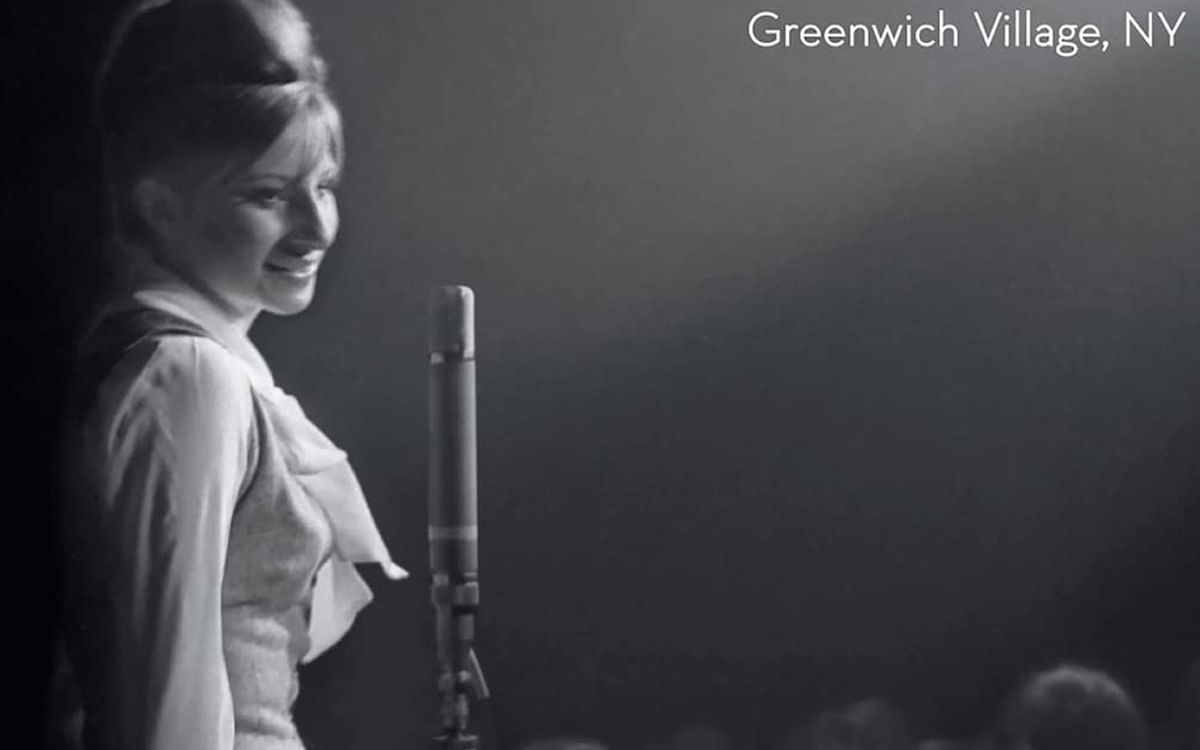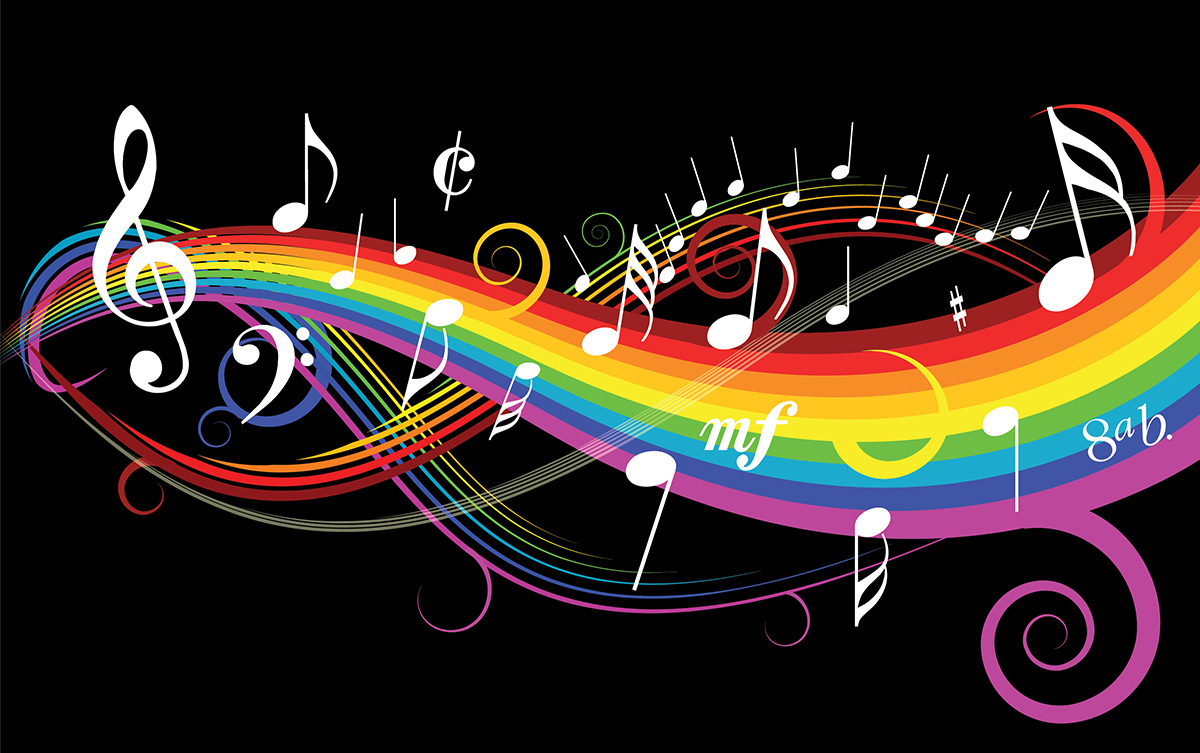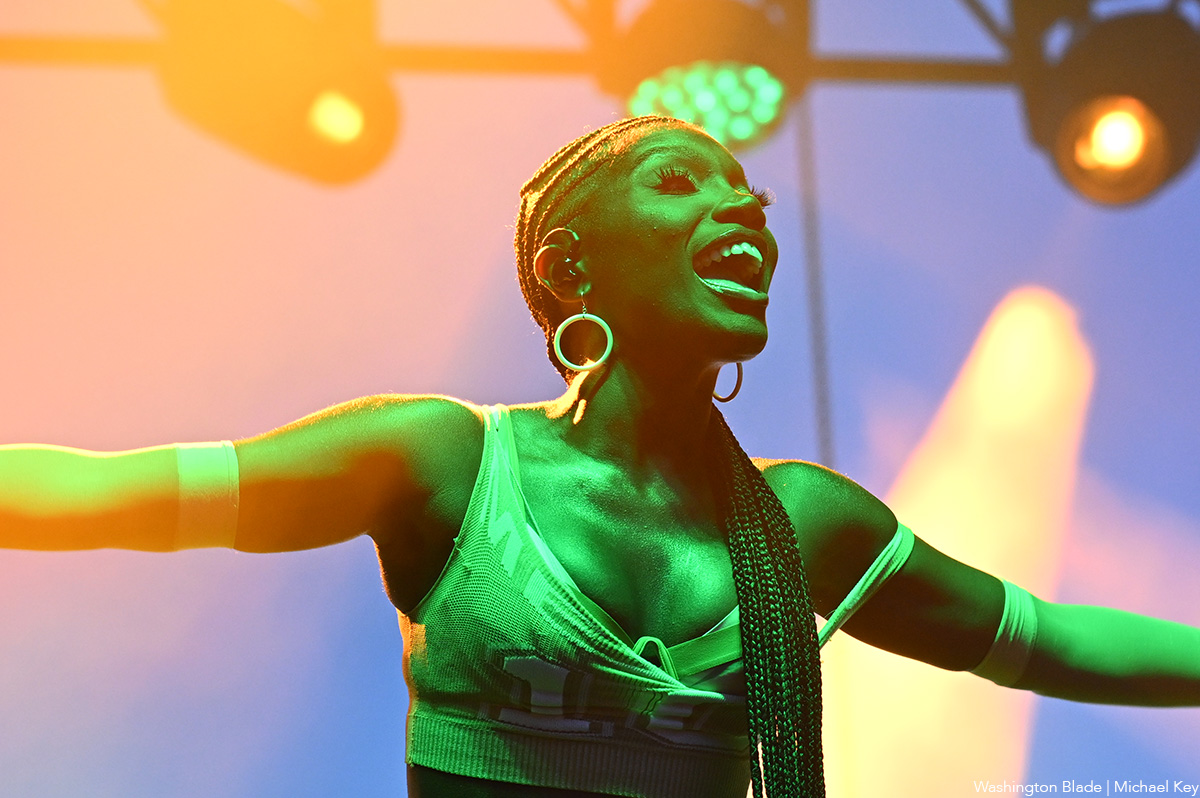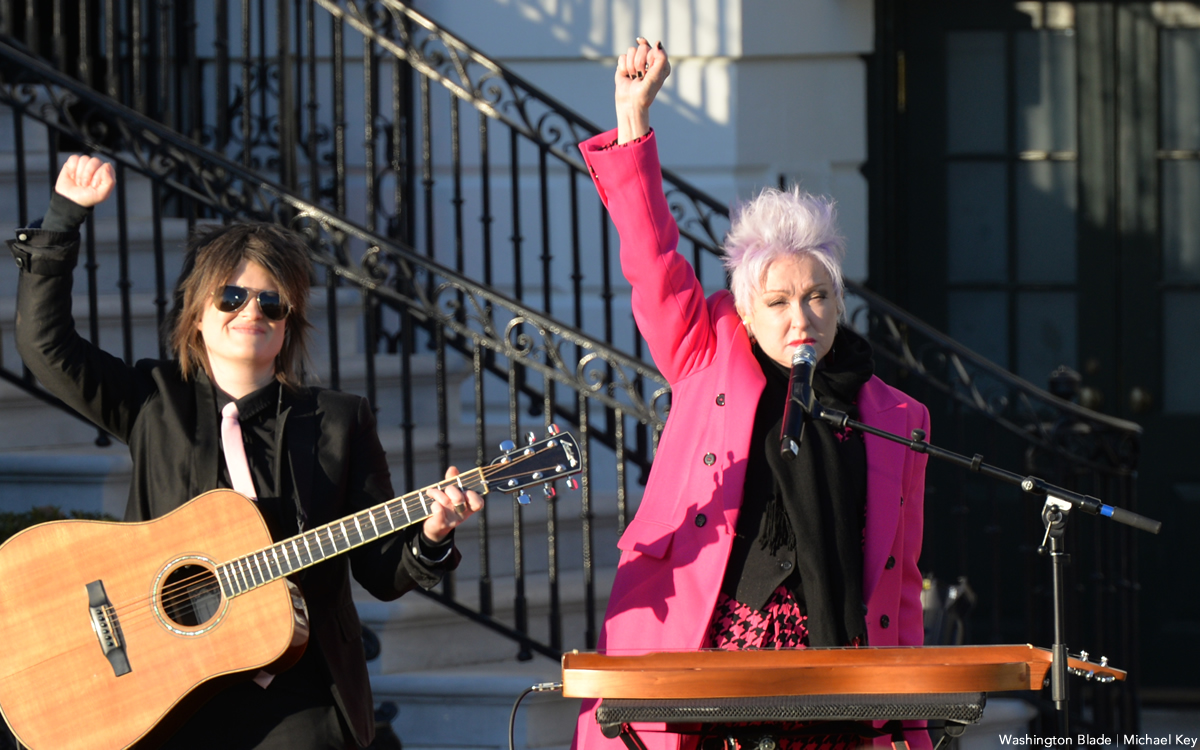Music & Concerts
Streisand’s ‘Live at the Bon Soir’: Birth of a diva
Album finally released 50 years after being recorded

Happy days are here again!
Sixty years ago, for three nights in November 1962, Columbia Records recorded a young (20-year-old) singer as she performed at the Bon Soir, a small nightclub in Greenwich Village. The singer’s name was Barbra Streisand, and the recording was slated to be her debut album. Streisand wasn’t that widely known then. But as (the character) Miss Marmelstein, Streisand was stopping the show nightly in the Broadway production “I Can Get It for You Wholesale.” After the show’s curtain call, she took a cab to perform at the Bon Soir club, according to the website barbra-archives.info.
But though the recording of Streisand live at the Village club was talked about the way you’d chat about an awesome legend, the album was shelved for more than half a century. Instead of releasing the “Live at the Bon Soir,” Columbia in 1963 released “The Barbra Streisand Album” (which was recorded in a studio) as Streisand’s debut album.
If you’re queer, you know Streisand rules! To the delight of critics, fans and mid-century history aficionados, on Nov. 4, six decades after it was recorded, “Live at the Bon Soir,” wonderfully remastered, was released on vinyl and SACD. It is also available on streaming services.
If you’ve fantasized about spending an intimate evening with Streisand (Barbra singing and engaging in witty repartee for just you and your intimates), “Live at the Bon Soir” is a dream come true. When Streisand says, “I wish there were another word for thank you…I mean, like, anything, you know” and introduces the club audience to her “boyfriend’s suit,” you feel that she’s talking directly to you.
Streisand’s voice is at its youthful, gorgeous best and her one-of-a-spectacular-kind personality comes through in her banter between songs. Listening to the album is an immersive experience. You’re witnessing the birth of a diva.
The album’s 24 tracks range from an indelible version of the torch song “Cry Me a River” to a playful rendition of “Who’s Afraid of the Big Bad Wolf?”
One of the best things about “Live at the Bon Soir” is its comprehensive, illuminating liner notes. Produced by Streisand, Martin Erlichman and Jay Landers, the CD of the album is packaged in a hardcover book with 32 pages of historical notes, photos and a message from Streisand. The vinyl version comes with a 12-page booklet. The notes provide insight into not only the making of the album, but of most interest to Streisand devotees, what it was like to perform live at the beginning of her career.
“I had never even been in a nightclub until I sang in one,” Streisand writes in the album’s liner notes about performing at and recording “Live at the Bon Soir.”
“I sang two songs in a talent contest at a little club called the Lion and won,” Streisand adds, “which led to being hired at a more sophisticated supper club around the corner called the Bon Soir, with an actual stage and a spotlight.”
The sound on the restored version of “Live at the Bon Soir” is much better than it was on the original recording.
“The science of recording has made quantum leaps since 1962,” writes Landers on the album’s liner notes, “Grammy Award winning engineer, Jochem van der Saag, has subtly solved audio issues in ways his predecessors could hardly have fathomed.”
Streisand has recorded albums with political and contemporary songs. These recordings are often superb. (Is anything by Streisand ever remotely bad?)
But “Live at the Bon Soir” is a gift to anyone who loves standards from the American song-book – from “I Hate Music” (Leonard Bernstein) to “Right as the Rain” (Harold Arlen/E.Y. Harburg) to “Come To The Supermarket (in Old Peking)” (Cole Porter) to “Happy Days Are Here Again” (Jack Yellen/Milton Ager).
Even if you’re allergic to show tunes, you’ll be entranced by “Live at the Bon Soir.”
The Blade may receive commissions from qualifying purchases made via this post.
Music & Concerts
Washington chorale kicks off Christmas with vibrant program
‘Thine Own Sweet Light’ concerts planned

The full Washington Master Chorale will return for its annual holiday concert tradition with “Thine Own Sweet Light” on Friday, Dec. 19 and Sunday, Dec. 21 at St. Ann’s Catholic Church (D.C.) and Church of the Epiphany (D.C.).
The concert will feature the rich sounds of the 50-voice, a cappella chorus performing lush, seasonal choral music inspired by the theme of light. Highlights include Edvard Grieg’s “Ave Maris Stella,” Eric Whitacre’s “Lux Aurumque,” and Christopher Hoh’s “Holy, Holy, Holy is the Lord God of Hosts.” The program will also present a new work by Barcelona composer Josep Ollé i Sabaté, along with charming holiday folk songs and seasonal favorites.
For more details, visit the Washington Master Chorale website.
Music & Concerts
Queer mega stars (and allies) ready to take D.C. stages this fall
Watch LGBTQ icons light up stages across the DMV as they sing, dance, and drag their way through spectacular shows.

One of the best ways to welcome fall is by catching LGBTQ performers (and their allies) lighting up some of the D.C. area’s biggest stages. From country and pop to drag and rock, the season is packed with shows you won’t want to miss.
Maren Morris – The country, rock, and pop diva—known for hits like “The Bones” and for standing up against Nashville’s anti-LGBTQ voices—takes the stage at Wolf Trap (1551 Trap Rd, Vienna, Va.) on Friday, Sept. 12 at 8 p.m. Tickets start at $64.
RuPaul – The mother of modern drag and host of “RuPaul’s Drag Race” will spin a DJ set at Echostage (2135 Queens Chapel Rd NE) in Northeast D.C. on Sept. 20. Before RuPaul swaps wigs for headphones, Trade and Number 9 owner Ed Bailey will warm up the decks. For tickets and details visit echostage.com.
Conan Gray – The queer pop prince, celebrated for his Gen Z anthems like “Heather” and “Maniac,” brings his Wishbone Pajama Show to EagleBank Arena in Fairfax, VA, (4500 Patriot Cir) on Sept. 20 at 8 p.m. Tickets start at $113. For more info visit shop.conangray.com/pages/tour.
All Things Go Music Festival – With a lineup that includes Noah Kahan, Lucy Dacus, Kesha, Clairo, Doechii, and more, the beloved LGBTQ-friendly festival takes over Merriweather Post Pavilion (10475 Little Patuxent Pkwy, Columbia, Md.) Sept. 26–28. For tickets and details visit allthingsgofestival.com.
BERTHA: Grateful Drag – This unique tribute brings drag artistry and the sounds of the Grateful Dead to The Atlantis (2047 9th St NW) on Sept. 27. Tickets start at $47 at theatlantis.com.
Peach PRC – Rising Australian pop star and out lesbian, whose confessional tracks like “Perfect for You” and “Forever Drunk” have made her a queer TikTok darling, performs at The Atlantis on Sept. 29 at 6:30 p.m. The show is general admission only. Additional details are on theatlantis.com.
Addison Rae – The TikTok star-turned-pop princess, who’s crossed over into music with glossy hits like “Diet Pepsi” brings her sold out show to The Anthem (901 Wharf St., S.W.) on Sept. 30. Tickets are sold out, but resale options start around $80. For more info visit theanthemdc.com.
The Rocky Horror Picture Show 50th Anniversary – Celebrate the cult classic that’s been a queer midnight-movie staple for decades, with Barry Bostwick (a.k.a. Brad Majors) at the Warner Theatre (513 13th St., N.W.) on Oct. 2 at 8 p.m. Tickets start at $41 via Ticketmaster.
Chaka Khan, Patti LaBelle, Gladys Knight & Stephanie Mills – Four legends, one stage. Between Khan’s funk, LaBelle’s soul, Knight’s R&B, and Mills’ powerhouse vocals, this concert at Capital One Arena (601 F St NW) on Oct. 3 at 8 p.m. promises pure diva magic. Tickets start at $103. For more details visit capitalonearena.com.
Lorde – Joined by The Japanese House and Chanel Beads, the Grammy-winning New Zealand singer-songwriter behind “Royals” and “Solar Power” returns to The Anthem on Oct. 4 at 7 p.m. Lorde has long been embraced by queer fans for her dreamy pop and subversive lyrics. For more info visit theanthemdc.com.
Andy Bell (of Erasure) – The British queer rock icon, best known for synth-pop classics like “A Little Respect” and “Chains of Love,” brings his Ten Crowns Tour to the Lincoln Theatre (1215 U St., N.W.) on Friday, Oct. 17 at 8 p.m. Tickets are $90.45.
Doechii – The self-described queer “Swamp Princess”—and WorldPride 2025 headliner—continues her breakout year with the Live from the Swamp Tour at The Anthem on Oct. 21 at 8 p.m. Known for blending rap, R&B, and avant-garde performance art, Doechii is one to watch. Tickets start at $153.
Neon Trees – The out-and-proud Utah rockers behind “Everybody Talks” and “Animal” perform at the Lincoln Theatre on Friday, Oct. 24 at 8 p.m. Lead singer Tyler Glenn, who came out publicly in 2014, has become a strong queer voice in alternative rock. For tickets and info visit impconcerts.com.
Sasha Colby – The “RuPaul’s Drag Race” Season 15 winner strips down on the Stripped II Tour at the Warner Theatre on Nov. 2 at 8 p.m. Tickets available now on Ticketmaster.
Lola Young – The bisexual indie-pop sensation, whose raw songwriting has earned her millions of TikTok fans and multiple chart soaring hits visits The Anthem on Nov. 9 at 8 p.m. Tickets are still available.
Opera Lafayette
Featuring Mary Elizabeth Williams as Dido
+ Elijah McCormack, Chelsea Helm
Oct. 16, 7:30 p.m.
Sixth & I
PostClassical Ensemble
The Pale Blue Do: A Musical Voyage Inspired By Nature
Featuring National Geographic’s Enric Sala, Guest Curator
Wednesday, November 19, 7:30 p.m.
Terrace Theater
Washington Concert Opera
Starring Kate Lindsey, Theo Hoffman, John Moore, and Fran Daniel Laucerica
Nov. 23, 6 p.m.
Lisner Auditorium
Washington Master Chorale
An intimate a capella concert taking place in an architectural jewel, featuring cherished choral gems from Anglican and Catholic tradition and early American hymns. The concert will also present the world premiere of Christopher Hoh’s Holy, Holy, Holy is the Lord God of Hosts, and hymn singing featuring Robert Church, organist and choirmaster at St David’s.
Oct. 18, 7:30 p.m.
October 19, 5 p.m.
St. David’s Episcopal Church
Music & Concerts
Cyndi Lauper ready to have fun in Virginia
Superstar to bring final leg of farewell tour to Jiffy Lube Live

Superstar Cyndi Lauper will bring the final leg of her farewell tour “Girls Just Wanna Have Fun” to Bristow, Va., on Thursday, July 24 at Jiffy Lube Live.
Lauper’s international Farewell Tour – her first major headlining run in a decade – kicked off in North America last October, and included her first time ever headlining (and selling out) Madison Square Garden. Lauper’s performances have earned raves from the New York Times, Rolling Stone, Billboard, and many more, and surprise guests have included Chaka Khan, Sam Smith, and Hayley Williams. The tour just visited the U.K. and Europe, and will head to Australia and Japan in April.
Tickets are available on Live Nation’s website.




















